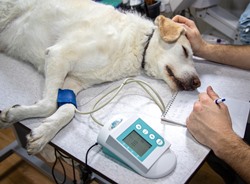IT TAKES JUST A FEW MINUTES TO START YOUR VET TECH CAREER BELOW
Vet Technician Degree Options

Among the first decisions that you will have to make is if you wish to train as a veterinary technician, assistant or technologist. Part of your preference might be based on the amount of time and money that you have to commit to your education, but the primary determiner will undoubtedly be which specialization appeals to you the most. What technicians and assistants have in common is that they all work under the direct direction of a licensed and practicing veterinarian. And although there are numerous jobs that they can perform within the Connecticut veterinary practice or hospital, they can't prescribe drugs, diagnose ailments, or conduct surgical procedures. In those areas they can only furnish support to a licensed veterinarian. There are technologists and technicians that work away from the standard vet practice, for example for zoos, animal shelters or police departments. Let's take a look at the duties and training prerequisites for each specialization.
- Vet Assistants in most cases will have completed a structured training program, either as an intern or apprentice in a vet clinic or hospital, or by completing a certificate program at a community college or trade school. As the name implies, their job function is to assist the veterinarians and vet technicians in the completion of their duties. Generally they are not involved with more involved tasks, for instance assisting with surgical procedures. Some of their typical functions may include working at the front desk, cleaning and preparing exam rooms and equipment, or controlling pets during examinations.
- Vet Technicians get more extensive training in contrast to assistants and typically obtain a two year Associate Degree, ideally from an American Veterinary Medical Association (AVMA) accredited program. They are in a fashion the veterinary equivalent of medical nurses, since their general job duty is to assist vets with diagnosing and treating animal patients. Where they stand apart from vet assistants is that they are engaged in more involved functions, for example assisting with surgeries or administering medicine. All states currently require veterinary technicians pass a credentialing examination for either licensing, registration or certification.
- Vet Technologists are comparable to vet technicians and basically perform the same job functions. They are mandated to obtain a Bachelor's Degree in veterinary technology, which typically takes four years to complete. Therefore the only real distinction between a vet technologist and a technician is the technologist's higher level of education. But with an advanced degree comes more work options, increased salaries and potential management positions. They are additionally mandated to pass a credentialing examination for either licensing, registration or certification.
Vet technicians and technologists may specialize in areas such as anesthesia, internal medicine or urgent care. Many may earn certification from the American Association for Laboratory Animal Science (AALAS) to work in Connecticut laboratories or research facilities also.
Online Veterinary Technician Programs Offered
 An alternative that might make sense for those with a hectic schedule or who are working full-time while attending veterinarian school is to enroll in an online training program. Because the classes are made available by means of the internet, students can study on their own schedule wherever a computer is accessible. The syllabus is taught using multiple venues, including videos, slide shows and live streaming webinars. And since many vet technician and technologist degrees require clinical training, that portion can usually be fulfilled as an internship or work study program at a local Connecticut veterinarian practice or hospital. Distance learning, as it is also called, may in some instances decrease the cost of your education. Tuition and ancillary costs, such as for traveling and study supplies, can be more affordable compared to more standard classroom programs. Just make sure that the program that you select is accredited, either by the AVMA or another nationally certified accrediting organization. With the online courses and the clinical training, everything is included for a complete education. So if you are dedicated enough to learn in this more self-reliant manner, an online veterinary technician program may be the right choice for you.
An alternative that might make sense for those with a hectic schedule or who are working full-time while attending veterinarian school is to enroll in an online training program. Because the classes are made available by means of the internet, students can study on their own schedule wherever a computer is accessible. The syllabus is taught using multiple venues, including videos, slide shows and live streaming webinars. And since many vet technician and technologist degrees require clinical training, that portion can usually be fulfilled as an internship or work study program at a local Connecticut veterinarian practice or hospital. Distance learning, as it is also called, may in some instances decrease the cost of your education. Tuition and ancillary costs, such as for traveling and study supplies, can be more affordable compared to more standard classroom programs. Just make sure that the program that you select is accredited, either by the AVMA or another nationally certified accrediting organization. With the online courses and the clinical training, everything is included for a complete education. So if you are dedicated enough to learn in this more self-reliant manner, an online veterinary technician program may be the right choice for you.
